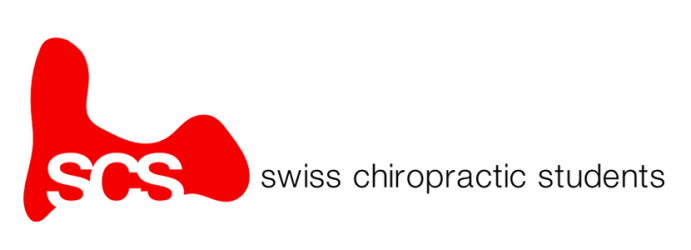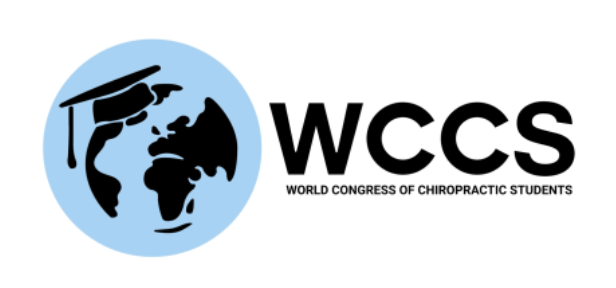
Ladies and Gentlemen,
Dear Chiropractors of Switzerland,
Dear fellow students
The AGM (Annual General Meeting) 2023, as an international event of the WCCS (World Congress of Chiropractic Students), has successfully taken place in Trois Rivières, Canada from 2nd to 8th of July 2023. It was an honor to represent the Chiropractic fraction of the University of Zurich in this worldwide student organization.
Due to the Corona Pandemic, the AGM 2023 was the first international event of the WCCS in the last four years, which did not take place virtually. Michelle Fontana, Kyra Heller and I (Sara Fröhlich) have been given the opportunity to travel to Canada and attend the congress, learn about other Chiropractic programs and connect with people from all over the world who share our passion.
The vision of the WCCS includes a global consciousness of chiropractic and acceptance as an evidence-based treatment in the global world of medicine.
Throughout the week the congress started at 9.30am and did not finish until 5 or 6pm. The agenda was packed with presentations delivered by various chiropractors, deliberations on proposals authored by the WCCS Board of Directors, and the process of nominating and voting for individuals seeking roles within the WCCS leadership.
Apart from the speeches and discussions, there was also time for social activities, allowing us the valuable opportunity to connect with fellow students and share our experiences regarding the application of chiropractic in their home countries.
The unique experience of an event like the AGM coupled with the drive and passion for chiropractic would not have been possible without the great support and generous backing of already established chiropractors. We want to take this opportunity again to say a massive thank you to all the sponsors who made such an incredible experience possible. We feel honored to represent the Swiss Chiropractic Students at an international event.
With kind regards,
Sara Fröhlich, Kyra Heller and Michelle Fontana
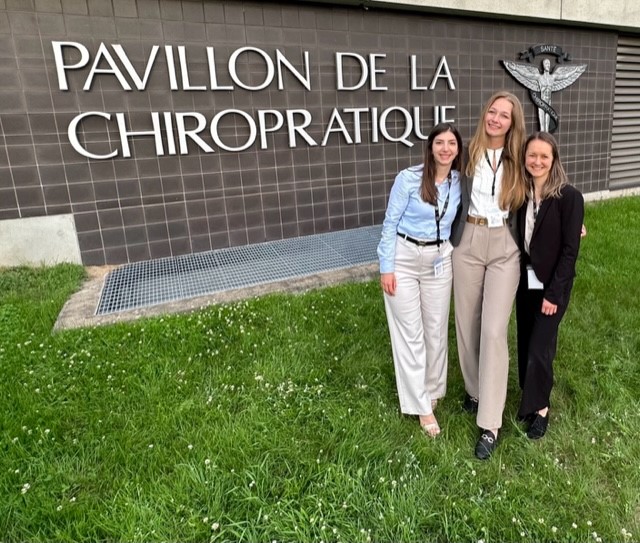
Detailed Report of the AGM 2023 in Trois Rivières
Before I start with a detailed weekly report structured as a dairy I would like to give a short summery of the goals and ideology of the WCCS.
As stated on the official website (www.wccsworldwide.org), the four main goals of the WCCS are:
-
To promote and advance access to chiropractic care by encouraging and supporting interprofessional collaboration, research and professionalism.
-
To promote unity by providing a politically neutral and inclusive platform where chiropractic students may respectfully share and debate both chiropractic and healthcare issues.
-
To provide the opportunity for the development and growth of leadership skills amongst chiropractic students.
-
To represent the values and opinions of chiropractic students to professional, governmental and non-governmental organizations.
Monday
On our first day we started with an introduction of the actual president of the WCCS and with a short overview of the week. After that, Danica Brousseau, M.Sc., D.C., held a presentation about the Interprofessional Education at UTQR (University of Quebec in Trois Rivières).
She pointed out the importance of interprofessional networking in the medical field and how much added value interprofessional boards on regular bases could bring for the patients’ health.
Aside from that she also mentioned the difficulties in including it in a regular program due to the different length and curriculum of the disciplines.
After a short break we had the opportunity to visit the student clinic at UQTR. They showed us their training rooms, training devices and also the patient rooms.
My biggest admiration received the FSTT table, which records the speed and power during an impulse. This assistance gives the operator the opportunity to visualize their impulses and practice a specific amount of power as well as the preload.
The patient rooms in the clinic, where students in clinic practice their skills are outfitted with cameras that transmit video to another room. In this separate room, additional students have the opportunity to observe the treatment and provide feedback afterward.
After a delicious lunch we were honored to hear a presentation from Ayla Azad, D.C., M.B.A. about Diversity, Equality and Inclusion in the profession and why it holds significance in practical application.
She emphasized the significance of making chiropractic an integral part of every Canadian health care team. Referring to public opinion research she focused on four reasons which are the major challenges to fully emerge chiropractic as a preferred provider in health care. Utilization, Retention, other health care provider as a first reference and lack of trust in our treatment were the most mentioned challenges.
She also set value on encouraging us in our future practice and that we have the power to change the cultural authority of chiropractic in the country we work.
With many new impressions of the first day in congress we finished our day with a visit in the campus escalade (bouldering lounge) and a city tour in Trois Rivières. For us students, these social interactions hold nearly equivalent significance to the congress itself, aligning with one of the WCCS’ primary goals, which is fostering international networking.
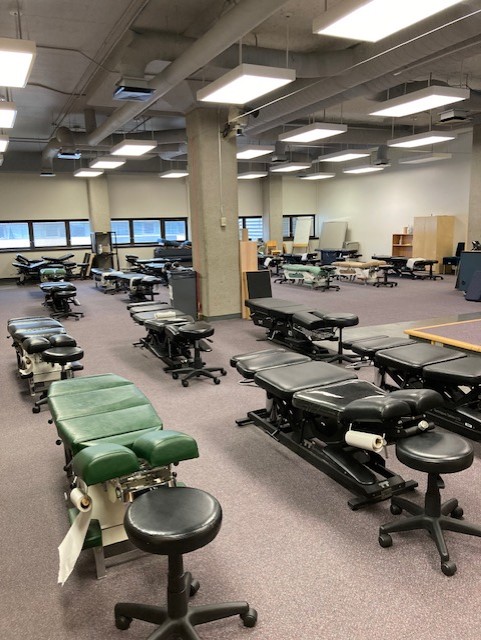
Tuesday
On Tuesday Morning we received an update from our Board of Directions and the events they have attended in the previous years. It is an honor for the WCCS to have the chance to represent the chiropractic students on organizations as such as FICS (International Federation of Sports Chiropractic) or the ICA (International Chiropractic Association). According to what we have heard on Monday, the focus was again on including chiropractic in the big field of health care – beyond its current state.
“You cannot build an island of success in a sea of failure”
In relation to this statement, he aimed to underline the significance of delivering consistent and evidence-based treatments in order to establish patients trust. This emphasizes the need for chiropractic care to consistently maintain a high standard, ensuring continued respect within the broader medical healthcare community.
On Tuesday afternoon we were honored to hear a speech from Dr. David Hayes, who talked about “Building Bridges in Chiropractic and Addressing Issues of Mutual Concern”.
His main points were a strategy to provide a patient-centered healthcare: Communiaction, Collaboration, Trust & Respect and Exemplary leadership.
Patients who express contentment with the treatment and care provided by a chiropractor significantly shape the perception of cultural authority. Based on this statement the future image of chiropractic in the population is in our hands!
After this intriguing and motivational speech, we had the opportunity to visit the Anatomy Lab of the UQTR (University of Quebec in Trois Rivières). The main difference to the dissection we have done at UZH is the preservative agent where the bodies are preserved. We, at UZH, have Formalin which causes a stiffness in the joints, whereas the bodies at UQTR are conserves with Thiel. Latest mentioned gives the opportunity to see how the soft tissues move during a movement in a certain joint.
The last speech on this day was about myofascial chains and its clinical management. This presentation pointed out the significance of adopting an integrated perspective toward the body. It highlighted the necessity of considering a specific body part (such as a painful joint or movement) within the broader context of the entire body recognizing its interconnection with other body parts that could contribute to the patient’s discomfort. After a long day in congress we let the day come to an end in a restaurant near the University.
Wednesday
We started our third day in congress with a speech about Congenital Muscular Torticollis (CMT) from Chantal Doucet, D.C., M.Sc.
At first, she emphasized on one of the major issues of chiropractic in pediatric. According to her experience in practice, the pediatric chiropractic is most vulnerable in the field of diagnosis, because the infants are unable to talk and the diagnosis needs to be set without an oral feedback from the patient.
With an epidemiology of 4% to 16% of births, CMT is a widespread issue in our population. After a short introduction to etiology and pathophysiology, three types of torticollis were mentioned which have a different cause.
Type 1: Caused by a bilateral muscular imbalance, this type presents itself in an opposite linked position of the cervical spine. An active rotation in the opposite direction is possible but it is followed by a passive flip back.
➔ Signs: Asymmetric breastfeeding, unusual behavior in prone position
Type 2: Caused by a tension the SCM (sternocleidomastoid muscle), these babies present a limitation in active and passive ROM
Type 3 (severe form): Presenting of olive in the first months with a palpable nodular induration in the SCM
➔ Sings: strong asymmetry of the face
Besides chiropractic treatment of these babies, Dr. Doucet also emphasized practical tips for parents such as holding the affected side of the SCM down while breastfeeding or increase the amount “tummy time” successively over time. Parental education holds a significant role in the realm of pediatric chiropractic.
As the second speech on that day, DR. Joe Lemire, Clinical Professor at UTQR was talking about “Life of an aging spine”.
An important initial emphasis he made was that addressing localized spinal pain through treatment requires careful consideration, and often, a chiropractor might not be the most suitable choice for such patients.
He also directed attention to spondylolisthesis, highlighting that it may not necessarily requires chiropractic treatment, particularly when dealing with young patients. In such instances, a reduction in physical activity could lead to a notable decrease in pain.
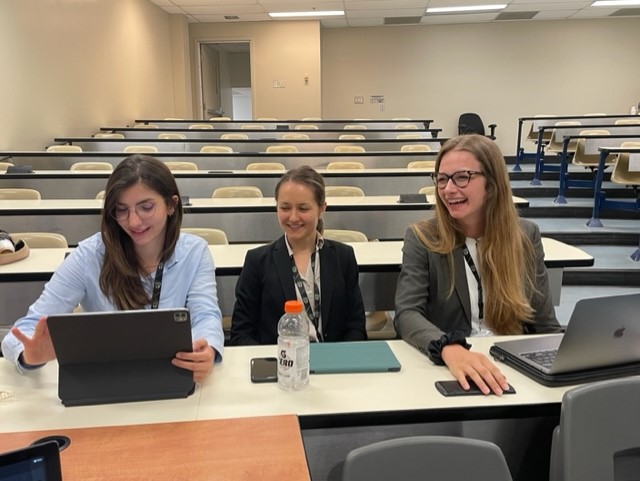
As the social activity on that day we enjoyed the famous Poutine as one of the most typical dishes in Canada.
A classic poutine is made from thick, hand-cut, golden brown French fries topped with fresh cheese curds and then smothered with piping hot velouté or gravy. It may not be the most visually appealing of dishes, but its distinctiveness ensures that it stands out as the national dish of a country which is not exactly world-renowned for its cuisine.
It is a French-Canadian fast food and originally invented in the province of Quebec in the 1950s.

Thursday
Besides the enriching days in congress we enjoyed our day off with a sight-seeing tour in Quebec, a historically important city in Canada. Due to its position at the St. Lorence – River, Quebec held significance as a pivotal port where colonies disembarked and commodities were transported to Canada via ships. A local guide showed us around the city and gave us a brief overview of the history of Canada, which goes, compared to Europe, not as far back in time.

Friday
Our last day at the AGM 2023 started with a presentation from Dean Wright about the topic “Risk mitigation and patient centered care go hand in hand”.
The risk within our profession stems from the reality that a small fraction of chiropractors face legal action each year when patients file lawsuit against them.
First, he introduced the CCPA (Canadian Chiropractic protection association) with its core values: Strength, Fairness, Expertise and Integrity. But as we are chiropractors from all over the world he additionally wanted to show us some key points to protect ourselves during our practice.
Record keeping was mentioned as an important part to make our treatment and diagnosis comprehensible for third parties. Furthermore, our examination process should be documented as precisely as possible to achieve a truthful and all-round description of each patient in our records.
Last but not least, he talked about the importance of doctors’ vigilance during a patient’s appointment, which allows us to detect little signs or also red flag as an indicator to refer the patient to another healthcare provider.
Moreover, the care for our own health worker team plays a tremendously important role in a safe practice. He highlighted this since many chiropractors offer treatment to their employees. While this is not inherently negative, it becomes particularly crucial in this scenario to prioritize throughout documentation. This is essential due to the potential of conflicts of interest and an uneven distribution of power. Every person we treat is a patient und should be treated equally, which makes our work more reliable.
As a last advice in this topic he focused on the doctor-patient-relationship and reminded us of the importance to maintain the personal distance between us and a patient (ex. do not go for coffee with a patient).
In the following Q&A session, one of the WCCS members shared an experience she had with a patient who behaved inappropriately and made sexual abusing comments. Besides the fact that young people in health care face this kind of difficulties, she also wanted to mention that students or assistant doctors which are still in an assessment are more likely to experience negative behavior of patients. Dr. Wright encouraged us to seek the conversation with our supervisor in case of inappropriate behavior of a patient. Moreover, do not hesitate to talk about this! Nobody should have the slightest feeling of abuse after treating a patient and how we feel is always a personal issue and cannot be predicted from the outside. He also elated us to contemplate our personal boundaries in advance of the patients contact, rather than reflecting on them afterwards. This approach aids in determining whether a behavior was inappropriate or not.
However, there are occasions when providing immediate feedback to the patient becomes necessary once we have organized our thoughts. This process assists us in reaffirming our viewpoint and sharing our personal perspectives and encounters.
Following this precise subject, we came to the elections and voting for proposals. To run for any position within the WCCS, candidates must submit a CV along with an application video. In this video, candidates have the opportunity to articulate their qualifications for the role and outline their envisioned accomplishments during their tenure in office. Michelle Fontana (UZH) applied for European Director as a part of the BoD. She made a persuasive statement in her virtual application and has consistently shown her commitment to the WCCS over the past four years. Due to her successful voting result, we are happy to send a UZH member to the BoD of the WCCS. Congratulation Michelle!
As the last speech of this year’s AGM, we were honored to listen to André Bussières about the topic “Spinal care – a Global Approach to a Complex Problem”.
He started with a question: Does monotherapy make sense in spinal therapy, especially because spinal problems often do not come alone? – think about it!
Spinal pain is an increasing health issue of today’s population and international organization are now starting to take it seriously. Patients with spinal pain often present with 1. Multisite joint pain and 2. Important comorbidities (ex. hypertonia, diabetes, adiposities,…) which leads to his second question: Is spine pain a comorbidity? – think about it!
He also talked about the continuing need of rehabilitation care in the near future, in which chiropractic treatment can be a part of. But what is rehabilitation? He defines it as a multimodal, person-centered, collaborative process with the aim to increase a person’s quality of life.
In his opinion a huge effort in rehabilitation work should be made in better education of necessities in spinal care. He also emphasized the importance of educating women and mother as the ones who are often in charge for the healthcare of their families.
To maintain a successful rehabilitation, a broad understanding of the patient’s issue is required. As a mnemonic for that, he explained the “F-Words” – Fitness, Family, Friends, Fun, Function
As mentioned with this quote, a global understanding of the patient’s environment is highly significant for a sound understanding of their issue.
With this conclusion we finished our last day at the AGM 2023 in Trois Rivières!
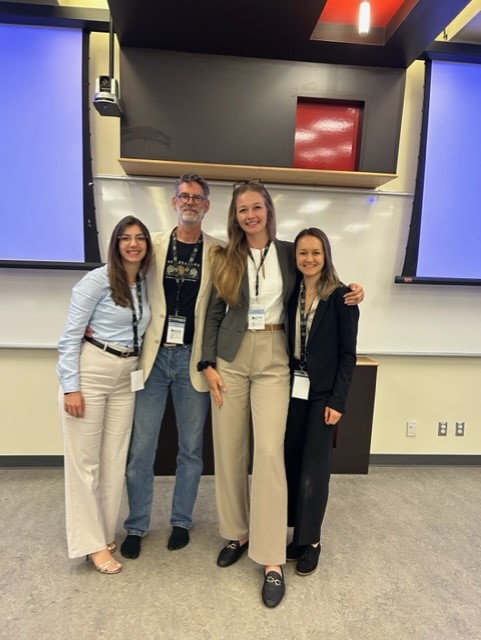
We feel more than honored and grateful to have been given the opportunity to attend the AGM 2023 as a Swiss Chapter. The value of seeing a worldwide enthusiasm on the field of work of chiropractic amongst young people and the intercultural exchange amongst fellow students is immense. The inspiring speeches were motivating to continue our education and showed an international approach to make chiropractic more popular in basic health care. Encountering individuals from across the globe who share our interests and received us warmly was a distinctive encounter. We eagerly await reconnecting with them at upcoming regional events (RE) or the annual general meeting (AGM).

